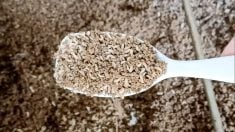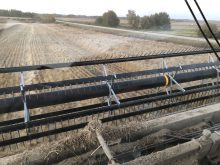As I sit here, writing this editorial, I’m recovering from the last lingering COVID symptoms.
I’m hardly alone in this. One recent study suggested that as many as 50 per cent of Canadians have had an infection now.
Based on anecdotal evidence from my circle of friends and family, I’m willing to believe that number, if not even wonder if it’s a bit low.
Read Also

Canadian agriculture has to back up diverse trade if it wants it
Cheap and easy access to U.S. trade is a relic of the past and market diversification is expensive: What’s Canadian agriculture to do?
One thing that’s very clear is they weren’t kidding that the Omicron variant is highly transmissible. It’s now said to be the fastest-moving virus in human history, outstripping even measles.
Thankfully, I’d had all my shots, and my symptoms were mild. If you can call one of the worst colds I’ve ever had combined with several days of absolute exhaustion mild. But compared to the cases others have suffered, and the countless deaths around the globe, I’ll take my outcome.
All I’m left with now is a lingering cough that kicks up periodically, and some shiny new biological defences to fight any future infections.
What I’m also left with, however, is a deeper understanding of just why the footprint of COVID has been so large, economically speaking.
It’s been blamed for widespread shortages, snarled supply chains and all manner of other challenges. Correctly, it would seem.
I’m left to consider just how ill I was, and for how long, and then extrapolate the cumulative effect on the human workforce. There aren’t any great numbers available just yet, but that impact has to be huge.
The worst of my own infection came over the Easter weekend, but even at that, I was forced to take the first two days of the following week as sick leave, pushing my workload onto my colleagues. And I am a guy who does much of his work sitting in front of a computer screen, and am not prone to taking a lot of sick days.
It made me very aware of the risks the working men and women around the world would be taking if they were to try to push their way through this one.
If one showed up at the metaphorical widget factory as sick as I was, it would be a recipe for losing a hand in widget-making machine No. 4. Or for killing someone while operating a piece of heavy equipment. Or causing any number of other industrial accidents.
It very much underlines that humans simply aren’t interchangeable cogs in the mechanism of modern capitalism. They have skills, abilities and they contribute to society through their industriousness. And in their absence, first businesses, and then society, suffer.
However, it’s also important to note that the level of inconvenience that most of us have suffered is at least of a manageable level. I was struck by this in recent weeks, reading the despatches of contributor Ihor Pavliuk from the wartorn Ukraine.
There people are shaken from their beds in the middle of the night by rockets landing, and farmers are forced to play the high-stakes game of removing errant ones from their fields before they can plant their crops.
By comparison my challenges of expensive produce, computer chip shortages and higher gas prices seem reasonably manageable. Nobody loves to see inflation rear its ugly head, but I am willing to bet that much of it is a combination of constricted production and supply combined with pent-up demand from the pandemic.
Once the worst of this experience is behind us, the hope is economic conditions return to something resembling normal. How it all works out is anybody’s guess, of course, but it doesn’t pay to lose a lot of sleep over it. All we can collectively do is try to be as prepared as we can, and deal with whatever comes along.
This spring is an excellent example of that. First we were staring at an enormous snowpack, and worrying about flooding. Then a nice slow melt came, and it seemed like everything was fine, only to have what seems like an interminable series of storms bearing down on us.
To quote a friend of mine: “Environment Canada can take its next special weather statement and stick it where the sun DOES shine.”
But, as the saying goes, ‘Everyone complains about the weather, but nobody ever does anything about it.’
All we can do is prepare for it. In my case that’s meant digging snow away from the foundation of the house, and contemplating awarding the sump pump with the family’s employee of the month award.
Hopefully it’s not tempting fate too much to say that it seems as though spring is finally upon us.
And while we’ll have to wait for things to dry up, the crop will get in this spring, and probably more quickly than we all think it will.
And in the meantime, most of us are recovering nicely from COVID when we get it, and nobody’s lobbing rockets at our houses and fields.
Frustrating as the past two years have been, it’s valuable to maintain that perspective.















